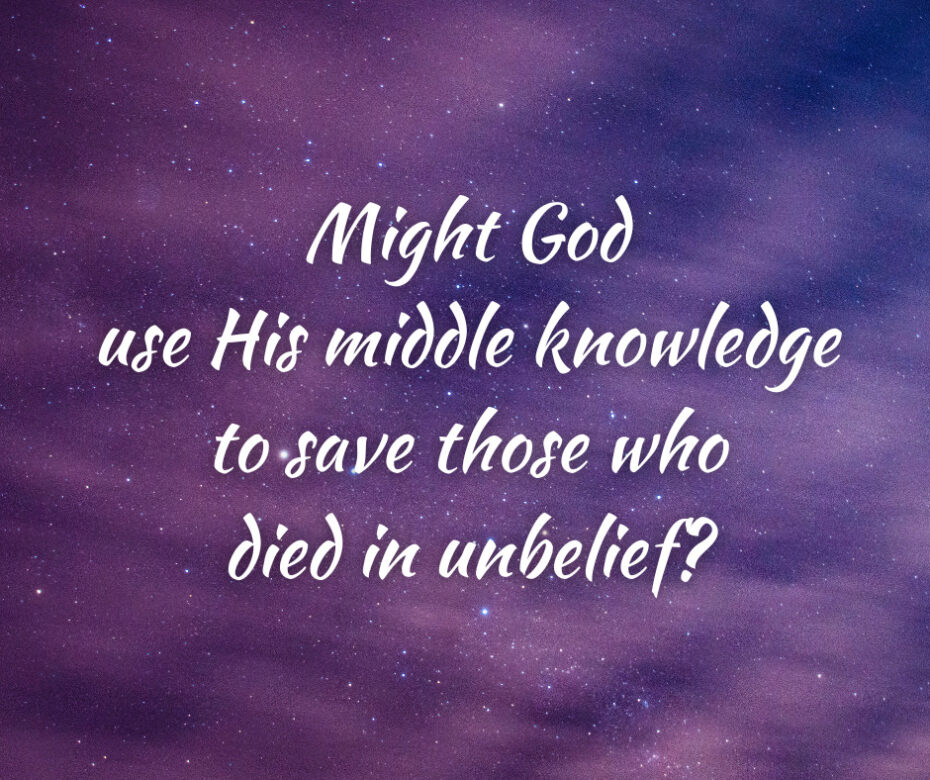The following question was put on the GES Facebook page:
Your recent post [that mentioned middle knowledge] leaves me wanting to know what your view is on God’s omniscience? Do you hold to simple foreknowledge, divine decrees, open theism, or middle knowledge (obviously not)? Or is there something between Calvinism and Arminianism?
Free Grace Theology (FGT) does not fall under Calvinism or Arminianism. It is a completely different way of looking at the Scriptures.
Both Calvinism and Arminianism teach that a person can believe in Christ, yet if he fails to persevere, then he will be eternally condemned. Calvinists say that the person who fails to persevere proves that he only believed intellectually but that he was not a true believer.
FGT says that perseverance is not guaranteed (in agreement with Arminians), but that the believer is eternally secure apart from perseverance (in disagreement with both Calvinism and Arminianism).
Let’s now discuss some of those concepts related to God’s omniscience. The word omniscience in a secular sense means knowing everything. But when used in relation to God, it means more than that. God knows not only everything that ever has happened, is happening at any moment, and will ever happen in the future, but He also knows everything that could have happened.
Simple foreknowledge refers to God’s knowing in advance what will happen. That is true. He could not prophesy with 100% accuracy otherwise. The Scriptures are clear that God causes much of what will happen in the future. He does, of course, allow us limited freewill. Men sin, but He restrains the sins of mankind. When the Rapture occurs, then the restrainer will be taken away and sin will increase even more (2 Thess 2:7).
Divine decrees are pronouncements God makes. FGT agrees that God has many decrees in Scripture. However, FGT does not agree with what Calvinism means by divine decrees. The Gospel Coalition, a Calvinist ministry, gives this definition: “God’s decree is his eternal purpose in governing the universe he made to unite all things in Christ. This includes his electing a people to be united to Christ while leaving others to the consequences of their sin” (see here). FGT does not believe that God elects anyone to everlasting life. Election in Scripture is to service, not regeneration. Nor does FGT believe that most people are doomed to eternal condemnation because God did not elect them and hence left them “to the consequences of their sin.”
Open theism (also called openness theology and free will theism) is the view that God does not know the future and that He makes educated guesses about it. They so emphasize man’s free will that they think the future is unknowable. FGT is strongly opposed to open theism. Ultimately the promise of John 3:16 is in doubt if God does not know the future, yet thousands of times in the Bible, He tells us that He does know the future and what will happen then. The Gospel Coalition makes this excellent point regarding open theism: “A God who is ignorant of the world he has made is certainly less than the Lord of the Bible” (see here).
Middle knowledge is the view that God knows what would have happened under different circumstances. For example, Jesus said that He would have brought in the kingdom in the first century if Israel had been willing (Matt 23:37-39). He also said that Tyre and Sidon would have repented if the works that He did in Israel had been done there (Matt 11:21). FGT agrees with Scripture and hence with middle knowledge. However, I think the reason why the reader thought we did not believe in middle knowledge is because we do not believe that God will use middle knowledge to save those who never believed in Jesus, but who would have under different circumstances. The Scriptures are clear that “it is appointed for men to die once, but after this the judgment” (Heb 9:27). The Lord Jesus said, “He who lives and believes in Me shall never die [spiritually]” (John 11:26a). See also John 8:21, 24. There is no opportunity for people over the age of accountability to be born again after they die in unbelief. What we were discussing in a Facebook post was speculation that God might use middle knowledge to save those who died in unbelief if they never heard about Christ and if they would have believed in Him under the right circumstances. I suppose most people would come to faith if given a Damascus-road appearance of the risen Lord. Besides, this use of middle knowledge could logically be extended to all who heard about Jesus but who did not hear a clear gospel presentation.
One bedrock principle of FGT is that whoever believes in Jesus has everlasting life and will never be eternally condemned (John 3:16). Its counterpart principle is equally true: whoever does not believe in Jesus before he dies will be eternally condemned (John 3:18, 36).1
___________
1 The exceptions are those who die before the age of accountability and those who never had sufficient mental ability to believe.


